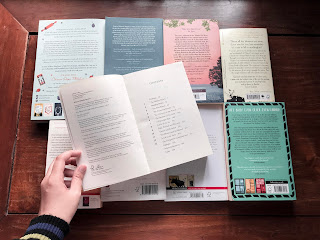"Do you think buying kindle would be more environmental friendly?"
A friend of mine asked me the above question a while ago. There are parts of her feel guilty for spending her money to buy books despite the fact that it makes her contributing to environmental damage. But was her thought true? Or was it just a fallacy?
As a book lover myself, I prefer printed book all the way around. The smell, the touch, and the taste of belonging are the essentials of having physical book which can't be acquired by buying e-book. I, too, have the same concern whether I am one of the perpetrators in environmental damage for fulfilling my own passion and hobby. Until one day, I caught a sight of a small icon that could light up my day.
Certain book publishers are certified by
FSC. Who is FSC? And why does it matter to our consumption in buying books and environment?
In short description, Forest Stewardship Council is an international non-profit organization promoting responsible management of world's forests. In brief, once you register your organization or products to FSC and you get their certification, it means that you're being responsible and lessen the environmental damages.
Can we buy the many printed books as long as it's certified? No, for me personally it's just self-assurance. It's an escape for your mind to reassure yourself that you're not a perpetrator of forests damage.
Then, is e-book much more environmental-friendly than physical book? I won't conclude in that way. To broaden your perspective in choosing which one is your fighter, I'd like you to read this
article.
So, what's your point Tar? My point is neither is completely environmental friendly. Both have certain impacts. At certain numbers, books produce fewer carbon dioxide gases during the production than e-book. Regarding the transportation in product delivery, books may cause tons of carbon emission than e-book one. Each has its own disadvantages and damages.
What I want to do as a printed book lover but aware of environmental damage, which you may to take it as a consideration as well, are:
1. Buy books with the publisher that's been certified by FSC
2. Reconsider if I really need to buy the book. I might find the alternatives such by borrowing it from a local library, or someone you know.
3. Read in daylight to reduce energy consumption.
4. Try bookswap with friends. This is such an exciting idea. (Update: I did it and it was fun!)
5. Consider to read e-book for certain books that haven't been certified yet.
6. Stop changing my device into the latest. Utilize the current one.
I think for now, that's what I want to implement in my daily life. I know this is not impactful yet for the environment but I believe every baby steps of changing could lead into something much better.
#SalamLiterasi #SelamatkanBumi
References:
https://archive.nytimes.com/www.nytimes.com/interactive/2010/04/04/opinion/04opchart.html
https://www.custommade.com/blog/e-readers-vs-print-books/
https://themillions.com/2012/05/are-ereaders-really-green.html


Comments
Post a Comment